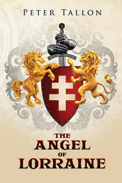
 |
The Angel of Lorraine: Part 3 of the Richard Calveley Trilogy
by Peter Tallon
BookVenture Publishing
England’s campaign through France continues not without resistance but certainly without setbacks. Captain Richard Calveley is there at the siege of Orléans, as the Dauphin’s men seem to be at their last resort. But when the bridges are destroyed, and the city is surrounded and left to starve, he is called away to oversee the training of reinforcements. While this is happening, a peasant girl named Jeanne Darc is hearing an escalation of the voices in her mind that come from heaven, and she is determined to drive the English out of her homeland in the name of the Lord. Gaining notoriety and eventually granted an audience with the Dauphin at the insistence of his beloved mother-in-law, the French army has a new leader and a symbol that they can put all of their hopes behind.
Before long, the paths of Richard and “Joan” intercept, with Richard forced to negotiate his own ransom in order to stall for time for Sir John Fastolf’s men to organize. An act of mercy displayed by Richard allows his plan to come to fruition, but why is he so quick to surrender? Part of it is his mission, knowing that he has no other way to buy time for his leader. The other part comes in the form of his personal life. As he gets older, the desire to retire to his lands with his wife and daughter grows, and there is also the son he just learned of living in Italy. As France’s push solidifies behind Jeanne and its state-of-the-art field cannons, Richard knows that no soldier lives forever on the battlefield.
Richard Calveley’s adventures continue in this third book of the series, smartly twisting historical fact into riveting and exciting fiction. Many of the events and important figures of the time figure into Richard’s journeys and encounters, and most are used not as props to tell a period story but rather function as the narrative outline. History is not changed in these books, only presented at a ground-level view with Richard as the vessel for the audience to do so. Between parleys and field warfare, the action moves at a satisfying clip. The author wisely allows himself the ability to cut away from each scene to present the conflict from all sides: English, French, soldier, and general. The point is driven home neatly that though the victors are typically those that influence the perspective of the history books, there are good people and wicked souls on any and all sides of a given human conflict.
Many times, in the name of preserving historical accuracy at all costs, characters in a novel of this genre can feel distant, untouchable, and struggle to generate empathy in the reader. Here there is no shortage of centuries-old detail, yet the dialogue and scenes feel plausible and real, as if the only separation between the modern audience and these late-medieval figures is the technology that surrounds them. As age begins to show its influence in Richard’s life, fans of the series will know that so too are his heroic days winding to a close, but there is still plenty of excitement and adrenaline left in this story’s battlefields. A more academic perspective is provided at the end of the book, as a section of micro-biographies gives an account of each character’s contribution to real-world history. Paced to entertain and written to celebrate and recall history, this conclusion to the author's engaging trilogy leaves its readers wholly satisfied and content.
RECOMMENDED by the US Review